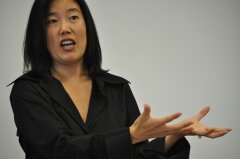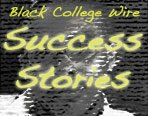| D.C. Chancellor Explains "Rhee Forms" to Howard Business Students |  |
 |
 |
| By Riley Wison -- Black College Wire | |
|
Education, one of the most controversial topics in America, was put up for discussion when D.C. Chancellor Michelle Rhee came to visit Howard University's School of Business to discuss her thoughts on education reform and what it takes to make change. In the midst of all of the Homecoming festivities, Rhee made a visit recently to Dr. Susan Harmeling's entrepreneurship class to discuss her thoughts on education reform and what it takes to make change. In an effort to keep the conversation candid and more informative, Rhee preferred not to be recorded. Harmeling began the discussion on Nov. 10 by explaining the relevance of Rhee's visit, saying that entrepreneurs are able to utilize their experiences to solve problems. "So what's the big idea of what Michelle Rhee did in her life?" Alluding to Rhee's Teach for America experience, Harmeling said "[Rhee] was able to look at ideas and experiences to solve problems." The discussion was somewhat informal and consisted of topics including Rhee's resignation as D.C. Chancellor and the success rate of District students. 
Ryan C. Hamilton/The Hilltop
Michelle Rhee at Howard
"I'm going to listen to what you got to say but don't expect me to do it. I do think there could have been a way for them to better understand the decisions and at least feel like they had a hand in the process." In the class, students could be seen nodding their heads at Rhee's comments. She shared many statistics with the class, commenting on the improvement of elementary school students in reading. Since 2007, there's been a 6.9 percent increase in overall reading scores, with the biggest jump being in 2008. Secondary schools in D.C. have made some gains in test scores from 2007 to 2010 as well, 13.5 percent and 16.6 percent respectively for reading and math. Compared to the national average, the scores still remain low. Christina Holder, senior management major, thought that Rhee's comments were relevant. "I appreciated her attitude towards education reform. In order to make drastic change, you have to take drastic measures," Holder said. "I thought she didn't beat around the bush--she was honest, straightforward." The conversation between Rhee and the students eventually began to focus on Rhee's leadership style. Rhee admits, "I did a bad job. I assumed that if we produced great results, everyone would be happy. I could not have been more wrong—what I didn't take into account was the political calculus." Rhee also commented on her firing of teachers and how she compares newly hired teachers with teachers that have been educated students for more than ten years. "We said that we were going to do something that no one else is doing. We said we were going to focus on the children. When evaluated, if there are struggling teachers early in the year—at the end of the year, we do expect them to improve. You have to put it in perspective of what's most important and that's students' growth." Rhee said teachers should earn their salaries. "We spend more dollars per child to educate our kids—and we had the worst percentages," Rhee said. In 2009, D.C. was the 6th highest paying state for teachers at an average $60,628 a year. Maryland teachers ranked number 8 at approximately $60,000. Even though D.C. teachers are paid more, students in Maryland perform better. In 2009, 85 percent of Maryland's 4th graders performed at or above basic level; whereas, only 56 percent of D.C. 4th graders performed on the same level. Nationally, 81% of 4th graders were above basic level. Rhee said these are the reasons she felt confident in firing "ineffective" teachers--the students' success rate. "You're going to be paid based on your results. You can't collect a paycheck with these ridiculously low expectations." When asked what she's going to do next with her career in education, Rhee said that whereever she goes--she will be on the ground level. "I've gotten a lot of calls but I don't think it's likely I'd take on another district. I'm a doer on ground level. I'm not a state-level policy person." If she had another chance, she said she would have found a way to "unlock the ‘silent majority. But those people were not the people showing up to the town halls." Rhee says these are the people who were informed of the statistics and supported her actions, but were not avid activists as much as the people who disapproved of her. Riley Wilson writes for The Hilltop, the Howard University student newspaper, which originally published this article. |
|
| Posted Nov. 16, 2010 |
| < Prev | Next > |
|---|



